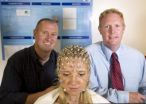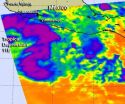(Press-News.org) It is commonly assumed that you can "work up an appetite" with a vigorous workout. Turns out that theory may not be completely accurate – at least immediately following exercise.
New research out of BYU shows that 45 minutes of moderate-to-vigorous exercise in the morning actually reduces a person's motivation for food.
Professors James LeCheminant and Michael Larson measured the neural activity of 35 women while they viewed food images, both following a morning of exercise and a morning without exercise. They found their attentional response to the food pictures decreased after the brisk workout.
"This study provides evidence that exercise not only affects energy output, but it also may affect how people respond to food cues," LeCheminant said.
The study, published online, ahead of print in the October issue of Medicine & Science in Sports & Exercise, measured the food motivation of 18 normal-weight women and 17 clinically obese women over two separate days.
On the first day, each woman briskly walked on a treadmill for 45 minutes and then, within the hour, had their brain waves measured. Electrodes were attached to each participant's scalp and an EEG machine then measured their neural activity while they looked at 240 images – 120 of plated food meals and 120 of flowers. (Flowers served as a control.)
The same experiment was conducted one week later on the same day of the week and at the same time of the morning, but omitted the exercise. Individuals also recorded their food consumption and physical activity on the experiment days.
The 45-minute exercise bout not only produced lower brain responses to the food images, but also resulted in an increase in total physical activity that day, regardless of body mass index.
"We wanted to see if obesity influenced food motivation, but it didn't," LeCheminant said. "However, it was clear that the exercise bout was playing a role in their neural responses to the pictures of food."
Interestingly, the women in the experiment did not eat more food on the exercise day to "make up" for the extra calories they burned in exercise. In fact, they ate approximately the same amount of food on the non-exercise day.
Larson said this is one of the first studies to look specifically at neurologically-determined food motivation in response to exercise and that researchers still need to determine how long the diminished food motivation lasts after exercise and to what extent it persists with consistent, long-term exercise.
"The subject of food motivation and weight loss is so complex," Larson said. "There are many things that influence eating and exercise is just one element."
Bliss Hanlon, a former graduate student at BYU, was the lead author on the study and Bruce Bailey, an associate professor of exercise science, was a co-author on the study.
INFORMATION:
BYU study: Exercise may affect food motivation
Research challenges assumption that you can 'work up an appetite'
2012-09-13
ELSE PRESS RELEASES FROM THIS DATE:
Feeding microbials to chickens leads to mysterious immune response
2012-09-13
A paper recently published in the Journal of Animal Science helps researchers further understand how microbials and probiotics affect poultry health.
Researchers at the North Carolina State University and Chung Jen College of Nursing, Health Sciences and Management (Taiwan) conducted a study to investigate the effects of direct fed microbials on energy metabolism in different tissues of broiler chickens. The researchers wanted to learn how consuming microbials and probiotics could change energy use and immune function. Typically, direct fed microbials and probiotics are ...
Hopkins scientists discover how an out-of-tune protein leads to muscle demise in heart failure
2012-09-13
A new Johns Hopkins study has unraveled the changes in a key cardiac protein that can lead to heart muscle malfunction and precipitate heart failure.
Troponin I, found exclusively in heart muscle, is already used as the gold-standard marker in blood tests to diagnose heart attacks, but the new findings reveal why and how the same protein is also altered in heart failure. Scientists have known for a while that several heart proteins — troponin I is one of them — get "out of tune" in patients with heart failure, but up until now, the precise origin of the "bad notes" remained ...
Smoking abstinence tough for teens, too
2012-09-13
Abstinence from smoking seems to affect teens differently than adults in a couple ways, but a new study provides evidence that most of the psychological difficulties of quitting are as strong for relatively new, young smokers as they are for adults who have been smoking much longer.
"Adolescents are showing — even relatively early in the dependence process — significant, strong, negative effects just after acute abstinence from smoking," said L. Cinnamon Bidwell, assistant professor (research) in psychiatry and human behavior and the Center for Alcohol and Addiction Studies. ...
NASA Global Hawk and satellites attend Tropical Storm Nadine's 'Birth'
2012-09-13
Tropical Depression 14 strengthened into Tropical Storm Nadine while NASA's Hurricane Severe Storm Sentinel Mission, or HS3 mission, was in full-swing and NASA's Global Hawk aircraft captured the event. While the Global Hawk was gathering data over the storm, NASA satellites were also analyzing Nadine from space.
NASA's Global Hawk landed back at Wallops Flight Facility, Wallops Island, Va., after spending a full day gathering data from the 14th Atlantic Tropical Depression that strengthened into Tropical Storm Nadine during the morning hours of Sept. 12.
The Global ...
NASA gives infrared identification of new Eastern Pacific Tropical Depression
2012-09-13
One of NASA's infrared "eyes" is an instrument that flies aboard the Aqua satellite, and it provided data that helped forecasters determine that low pressure "System 90E" strengthened into the eastern Pacific Ocean's eleventh tropical depression.
The Atmospheric Infrared Sounder (AIRS) instrument onboard Aqua captured an infrared image of System 90E on Sept. 11 at 1947 UTC (3:47 p.m. EDT). That infrared image took the temperatures of the cloud tops and found some strong, high thunderstorms wrapped around the western side of the low pressure area's circulation, from north ...
Gestational exposure to urban air pollution linked to vitamin D deficiency in newborns
2012-09-13
Chevy Chase, MD—Gestational exposure to ambient urban air pollution, especially during late pregnancy, may contribute to lower vitamin D levels in offspring, according to a recent study accepted for publication in The Endocrine Society's Journal of Clinical Endocrinology and Metabolism (JCEM). According to study authors, this could affect the child's risk of developing diseases later in life.
Recent data have demonstrated that maternal vitamin D deficiency during pregnancy may have an influence on the development of asthma and allergic diseases in offspring. A number ...
Puberty turned on by brain during deep sleep
2012-09-13
Chevy Chase, MD—Slow-wave sleep, or 'deep sleep', is intimately involved in the complex control of the onset of puberty, according to a recent study accepted for publication in The Endocrine Society's Journal of Clinical Endocrinology and Metabolism (JCEM).
The many changes that occur in boys and girls during puberty are triggered by changes in the brain. Previous studies have shown that the parts of the brain that control puberty first become active during sleep, but the present study shows that it is deep sleep, rather than sleep in general, that is associated with ...
Mild increases in thyroid-stimulating hormone not harmful in the elderly
2012-09-13
Chevy Chase, MD—There is no evidence to link mildly elevated thyroid-stimulating hormone (TSH) levels to an increase in mortality among the elderly, according to a recent study accepted for publication in The Endocrine Society's Journal of Clinical Endocrinology & Metabolism (JCEM). The findings suggest that reflexively treating mild elevations of TSH in those of advanced age is unnecessary.
TSH is a sensitive, commonly measured test to check thyroid function. TSH levels are inversely related to thyroid hormone levels – thyroid hormone levels below a set-point trigger ...
Moffitt cancer center researchers find novel predictor for MDS progression risk
2012-09-13
Researchers at Moffitt Cancer Center and colleagues have discovered that changes in the physical characteristics of the effector memory regulatory T cell can predict the progression risk of myelodysplastic syndromes (MDS) to acute myeloid leukemia. The finding could improve prognostication for patients with MDS and better inform therapeutic decision making.
The study published in the August issue of The Journal of Immunology.
Awareness of the condition increased earlier this year when ABC's "Good Morning America" co-anchor Robin Roberts announced that she is battling ...
qwica interactive Enables Park Benches to Inform and Engage
2012-09-13
Half of mobile phone users in North America today have smartphones, and that number is quickly growing. Canadian tech startup, qwica interactive, is capitalizing on the rapidly emerging trend of seamless information gathering utilizing smartphones and scannable barcodes called QR codes. The qwica system simplifies the creation and management of mobile-optimized web pages for customers and provides complete solutions for long-term and outdoor applications. qwica allows users to quickly access information and interactive content—even in multiple languages—by scanning a qwica ...
LAST 30 PRESS RELEASES:
Scientists discover why we know when to stop scratching an itch
A hidden reason inner ear cells die – and what it means for preventing hearing loss
Researchers discover how tuberculosis bacteria use a “stealth” mechanism to evade the immune system
New microscopy technique lets scientists see cells in unprecedented detail and color
Sometimes less is more: Scientists rethink how to pack medicine into tiny delivery capsules
Scientists build low-cost microscope to study living cells in zero gravity
The Biophysical Journal names Denis V. Titov the 2025 Paper of the Year-Early Career Investigator awardee
Scientists show how your body senses cold—and why menthol feels cool
Scientists deliver new molecule for getting DNA into cells
Study reveals insights about brain regions linked to OCD, informing potential treatments
Does ocean saltiness influence El Niño?
2026 Young Investigators: ONR celebrates new talent tackling warfighter challenges
Genetics help explain who gets the ‘telltale tingle’ from music, art and literature
Many Americans misunderstand medical aid in dying laws
Researchers publish landmark infectious disease study in ‘Science’
New NSF award supports innovative role-playing game approach to strengthening research security in academia
Kumar named to ACMA Emerging Leaders Program for 2026
AI language models could transform aquatic environmental risk assessment
New isotope tools reveal hidden pathways reshaping the global nitrogen cycle
Study reveals how antibiotic structure controls removal from water using biochar
Why chronic pain lasts longer in women: Immune cells offer clues
Toxic exposure creates epigenetic disease risk over 20 generations
More time spent on social media linked to steroid use intentions among boys and men
New study suggests a “kick it while it’s down” approach to cancer treatment could improve cure rates
Milken Institute, Ann Theodore Foundation launch new grant to support clinical trial for potential sarcoidosis treatment
New strategies boost effectiveness of CAR-NK therapy against cancer
Study: Adolescent cannabis use linked to doubling risk of psychotic and bipolar disorders
Invisible harms: drug-related deaths spike after hurricanes and tropical storms
Adolescent cannabis use and risk of psychotic, bipolar, depressive, and anxiety disorders
Anxiety, depression, and care barriers in adults with intellectual and developmental disabilities
[Press-News.org] BYU study: Exercise may affect food motivationResearch challenges assumption that you can 'work up an appetite'


